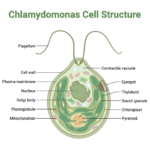IB Biology 236 Views 1 Answers
Sourav Pan🥇 GoldNovember 7, 2024
How does cholesterol affect membrane fluidity and permeability to certain solutes in mammalian membranes?
How does cholesterol affect membrane fluidity and permeability to certain solutes in mammalian membranes?
Please login to save the post
Please login to submit an answer.
Sourav Pan🥇 GoldMay 15, 2025
Cholesterol plays a significant role in influencing membrane fluidity and permeability to certain solutes in mammalian cell membranes. Here’s an overview of how cholesterol affects these properties based on the provided search results:
1. Effect on Membrane Fluidity
- Regulation of Fluidity: Cholesterol is essential for maintaining the appropriate fluidity of cell membranes. It acts as a stabilizer, preventing the fatty acid chains of phospholipids from packing too closely together, which would make the membrane too rigid. Conversely, it also prevents excessive fluidity by restricting the movement of phospholipids at higher temperatures. This dual role helps maintain a balance that is crucial for proper membrane function.
- Phase Behavior: Cholesterol influences the phase behavior of lipid bilayers. For instance, it can promote the formation of liquid-ordered (Lo) phases in membranes, which are more ordered than liquid-disordered (Ld) phases. This phase separation can create microdomains, such as lipid rafts, that are important for various cellular processes, including signaling and protein sorting.
2. Impact on Membrane Permeability
- Decreased Permeability: The presence of cholesterol significantly decreases the permeability of membranes to small water-soluble solutes. This effect arises because cholesterol fills spaces between phospholipid molecules, reducing voids in the membrane structure and creating a more compact arrangement that acts as a barrier to solute diffusion.
- Solute Partitioning: Cholesterol has been shown to decrease solute partitioning into the lipid tail region of membranes, which suggests that it increases the energy barrier for solutes attempting to cross the membrane. This means that larger solutes or those with specific properties may find it more difficult to permeate cholesterol-rich membranes compared to those with lower cholesterol content.
- Hydration Effects: Cholesterol also influences how water interacts with the membrane. It has been observed that adding cholesterol can prevent water molecules from following permeating solutes into the hydrophobic core of the membrane, effectively altering how solutes interact with the membrane environment
3. Concentration Dependence
- Cholesterol Concentration: The effects of cholesterol on fluidity and permeability are concentration-dependent. For example, increasing cholesterol levels can lead to a transition from Ld to Lo phases, which can dramatically change permeability characteristics. At higher concentrations (above 30%), cholesterol may condense lipid bilayers further, leading to decreased permeability coefficients for various solutes.
4. Biological Implications
- Membrane Protein Function: Cholesterol’s modulation of membrane fluidity and permeability has significant implications for the function of membrane proteins, including receptors and transporters. Changes in fluidity can affect protein conformation and activity, influencing processes such as signal transduction and nutrient transport.
- Health Implications: Understanding how cholesterol affects membrane properties is crucial in contexts such as cardiovascular health and neurodegenerative diseases, where altered cholesterol metabolism can lead to detrimental changes in cell membrane dynamics and function
0
0 likes
- Share on Facebook
- Share on Twitter
- Share on LinkedIn




